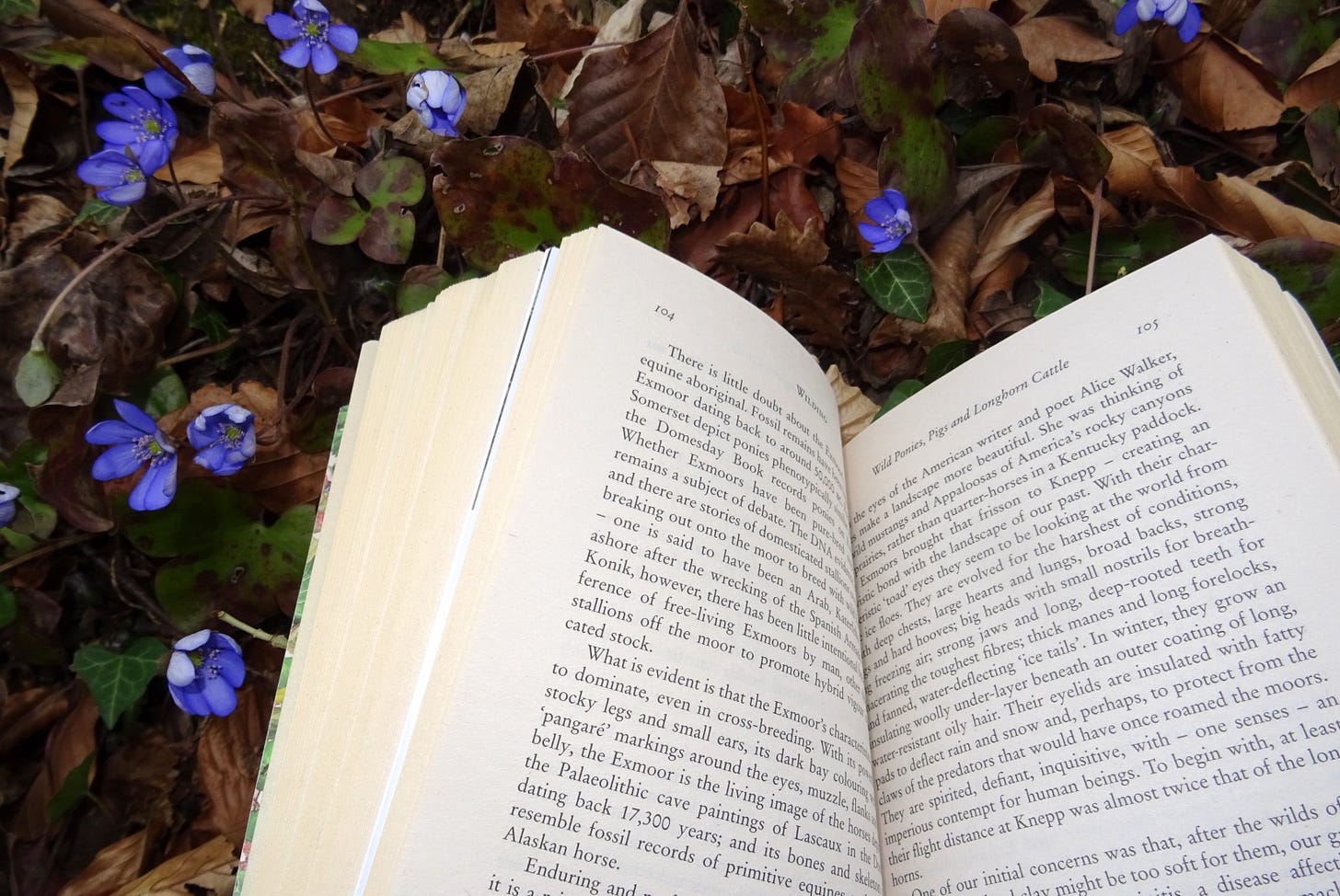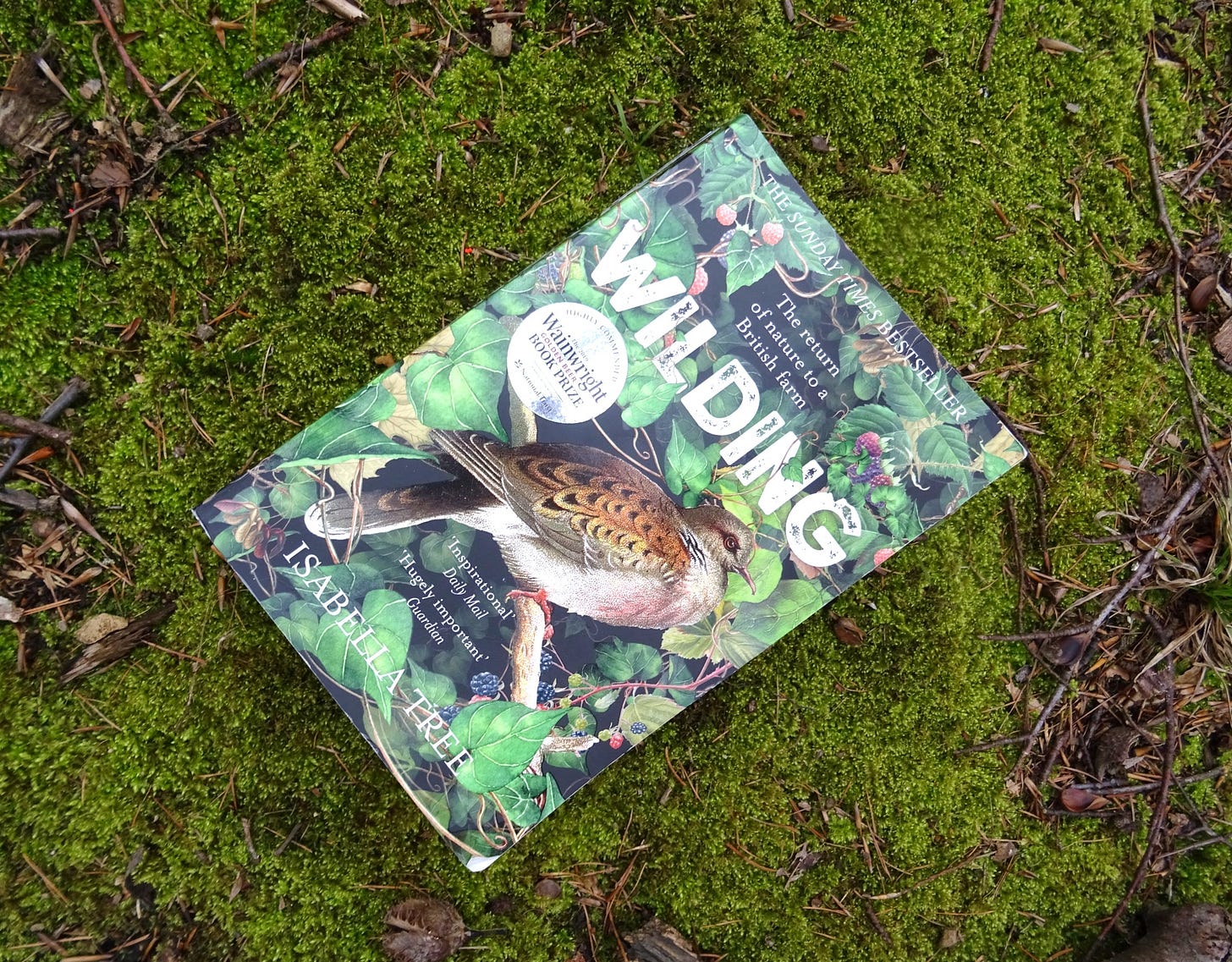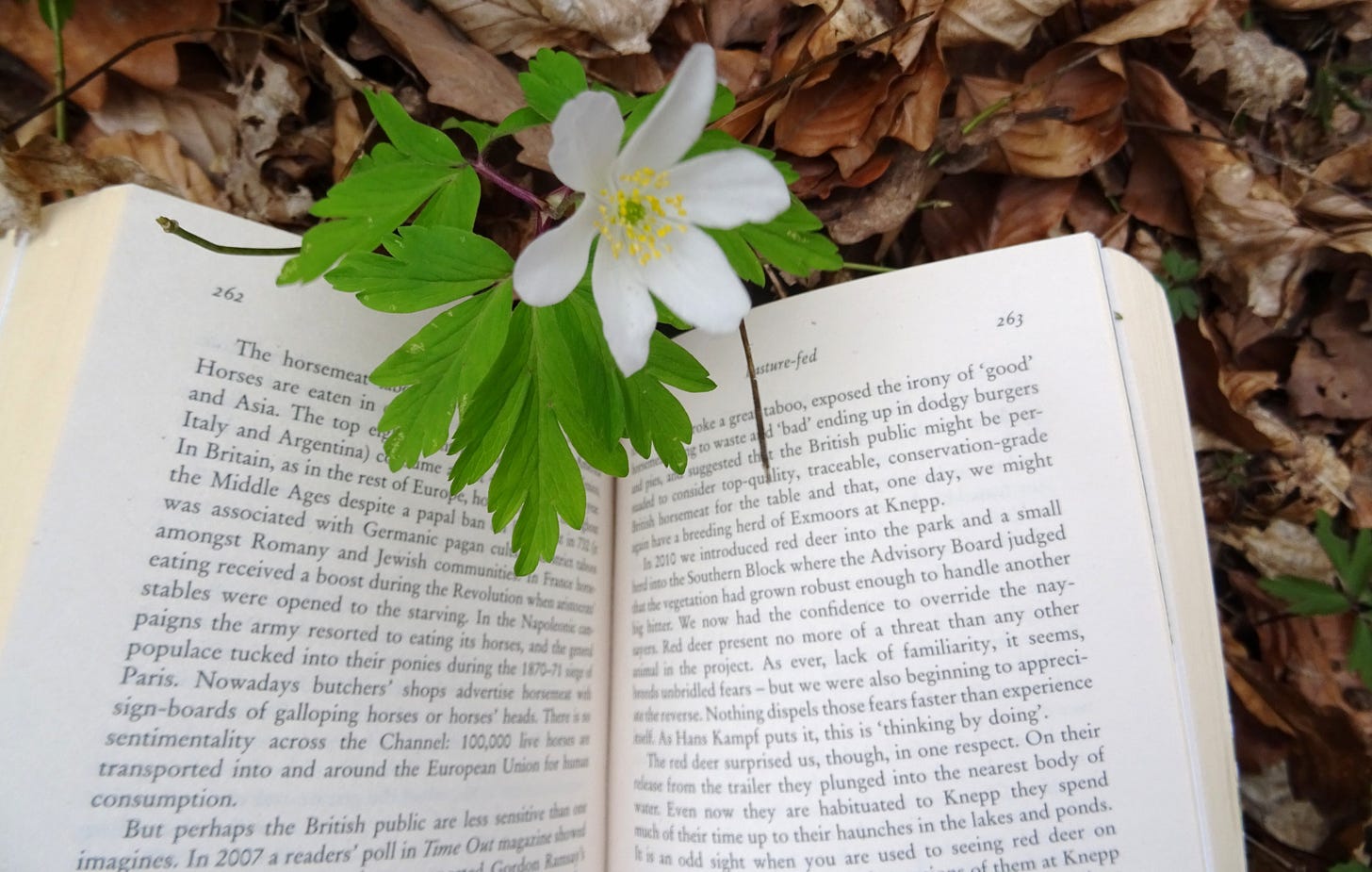Each month of 2025 will have a theme that guides my outdoor explorations and my reading. In March, the theme was Rewilding.
Hi readers, I hope your week has started well! Sorry, I’m a week behind in posting (probably nobody would have noticed if I hadn’t told you…) as I have been ill. So, I’ll share my March reading today and the April theme will follow next Tuesday.
Feral (Non-fiction by George Monbiot)
This book, published in 2013, is a classic of rewilding literature that contributed strongly to the popularity of the concept. So, of course I had to read it!
“Feral” combines George Monbiot’s personal memories, stories of rewilding projects and the people involved, and a host of factual knowledge about ecology, conservation, agriculture, and history. Monbiot laments the lack of wilderness in his own everyday life (and goes on somewhat irresponsible kayaking adventures to search for it), and he is sure he’s not the only one feeling this way. Hence, Monbiot makes a powerful call for rewilding – not mainly for the sake of nature, but for the sake of humans.
He especially goes into what rewilding would mean for the UK, his home country. He argues for a new perspective on the hilly moorlands, a widespread landscape type often actively protected by conservation programs. These landscapes are “ecologically impoverished” and maintained by human-introduced sheep grazing, but perceived as “wilderness” as a result of shifting baseline syndrome (accepting as normal what we have grown up with). Truly wild landscapes in Britain, Monbiot reminds his readers, would be forested – sustaining higher levels of biodiversity and inhabited by large herbivores and predators. He argues that we should let nature take control again, potentially in combination with re-introductions of large mammal species with key ecosystem functions. Wolf and lynx are obvious candidates, but Monbiot goes through a much longer list of species with rewilding potential that once existed in the UK – including elephants!
If you know George Monbiot’s writing, you’ll have an idea what this book is like: Vivid, enthusiastic, opinionated. It is nevertheless clear that he has discussed with people with contrary opinions and deeply thought about them. I enjoyed this book a lot – I found it intelligent and convincing, very readable and entertaining, and there is some beautiful nature writing to be found as well! The energy for positive change really comes across in this book.
Wilding (Non-fiction by Isabella Tree)
Another rewilding classic. It’s the story of how the author and her husband gradually turned a non-profitable farm in the south of the UK into a large rewilding project (the Knepp Rewilding Project). It’s a story of many obstacles – lack of funding, angry neighbours, clashing opinions about conservation – but ultimately one of great success.
A main premise is that before human influence, the landscape in Britain was shaped by large grazers, such as wild horses, deer, and the aurochs, leading to a mosaic landscape with open grassland, woodland, and wetland. To mimic their influence, the author and her husband successively introduced deer, cattle and ponies (as well as pigs, which work as natural ploughs) in the early 2000s. Apart from that, they mostly gave up control of the land. This has reinstated natural processes – for example, thorny shrubs are natural protectors for the growth of new trees, such as oak. The Knepp estate is now a rewilding poster child, with a complex mosaic of landscapes and many rare or endangered species of insects (e.g. emperor butterflies), mammals (e.g. multiple species of bats) and birds (e.g. turtle doves and nightingales).
On the negative side: To some extent, I can see why critics would call rewilding projects such as Knepp a “theme park” – most of the large mammals are domesticated breeds, their numbers are controlled via shooting, and the estate hosts various activities, such as weddings and team events. To me, this felt somewhat “toned down” compared to the wilderness I envisioned when reading Feral. I also think the scientific debate on Britain’s “natural” landscapes (dense forests vs. more open landscapes) isn’t settled yet, so some arguments might need to be taken with a grain of salt. Nevertheless, this was quite an enchanting read – the detailed descriptions of the (often unexpected) re-appearance of various species and the revival of a wilder landscape were fascinating. I also enjoyed learning more about agricultural history and conservation philosophy, which are discussed from a personal, easily digestible perspective. Overall, this was the book I enjoyed most this month, and I definitely recommend it!
Rewild yourself (Non-fiction by Simon Barnes)
I’ve complained in my last post that “human rewilding” can be anything – so, what does this book mean by “rewilding yourself”? It essentially means getting out into nature, feeling a sense of wonder, observing and experiencing nature more intensely than on a standard walk. And the book provides a toolbox for this: Simon Barnes, a well-known British nature writer (yes, apparently it was British Book Month again…), has collected 23 “spells” – from the magic of waterproof trousers to the thrill of a boat trip, from how to attract snakes to getting the right binoculars!
The writing style is evocative and enthusiastic – you feel the author’s passion for nature in every sentence. I particularly liked that the author encourages people to just do what works for them: It doesn't matter if you have no idea about birds or cannot spend a lot of money. Nature is for everyone.
I would say this book is probably targeted at people who don’t spend much time in nature (yet) – there wasn’t a lot of new information in it for me. However, I did enjoy it anyway, as it reminded me of some ideas I had half forgotten… and mostly, this book just felt very kind and positive and left me with an inspired feeling.
A psalm for the wild-built (Novella by Becky Chambers)
A psalm for the wild-built is one of the few fiction books that came up when I looked for “rewilding-themed” books. I actually started reading this book one or two years ago, but did not finish it because I got busy. But the beautiful atmosphere somehow stuck with me, so I was happy to pick it up again.
The story is set on the moon Panga, a utopian version of the Earth, where humans have developed a sustainable, nature-respecting, solar-based society. Half of the planet is wilderness, deliberately left to nature and usually not entered by humans.
Dex is a tea monk in this idyllic world. Despite a peaceful life without major troubles, they feel discontent and want to see something new (mainly, they want to see crickets!) – and so they travel into the wilderness. Unexpectedly, they meet a robot, Mosscap, who is on a mission to learn about humans (robots have gained consciousness and left the human world generations ago). The two start travelling together. Much of the book is describing their conversations, bringing up philosophical questions about the purpose of life, consciousness, and human-nature relationships.
Obviously, this book isn’t about the concept of rewilding. The rewilded part of the world is mostly a backdrop – though an important one, as I felt that the humble attitude of humans towards nature pervaded the whole book. To me, this book wasn’t so much about the story (overall, not a lot happens) but about envisioning a better world and our place as humans in it. Rather than going into detail about the technical solutions, the book conveys the atmosphere and value systems of such a world, and it does so beautifully!
While I found the character of Dex a bit difficult to grasp, I liked the robot Mosscap a lot – curiously, in the book, the robots have developed a deep interest in and close connection with nature, and Mosscap has a certain kind of naïve wisdom that I liked. When I think back to this book, I see a peaceful, lush, kind world I enjoyed spending time in.
Urban rewilding (edX online class)
This is not a book, but I thought I’d add it here as a useful resource on rewilding! edX is a platform that offers free online courses on a vast range of themes, usually provided by a university. They combine different teaching materials – in this case teaching videos, texts, references to external articles, podcasts, and quizzes.
The course (provided by Wageningen University) aims to explain the concept of urban rewilding, i.e. a range of approaches of bringing nature into our cities. It starts out with a general overview of the concept of rewilding and the issues that cities face (such as the urban heat island effect), and then shows how urban rewilding can make our cities healthier, more biodiverse, and more liveable. In addition to the teaching materials, the course includes a project where participants are encouraged to actively identify rewilding opportunities in their own city.
I quite enjoyed this course. The combination of different materials makes it engaging and easy to get through. I liked the urban perspective on rewilding: Rewilding can sometimes seem like some lofty goal that can only be achieved in a few places by people who own a lot of land, and it’s nice to remember that many of us can shift things in the right direction on a smaller scale as well.
I’ve learned a lot this March and I really got into the idea of rewilding. Each of these books (as well as the course) explores positive visions for the future in its own way – and I’m very convinced that such visions are what we need these days. Hopefully many of us can contribute to making the world a little bit wilder!
Hannah







I've read all but the Simon Barnes and loved them too! We visited the Knepp estate a few years ago and I found it a really mixed experience - found the whole thing very inspiring and saw some exciting birds but I didn't find the landscape particularly beautiful. I agree it contrasts with Monbiot's idea of wilderness! I found the Psalm book so soothing, the idea that there's a possible future where we agree to leave parts of Earth alone and still have beautiful and meaningful human lives. Being a tea monk sounds like the dream!
Such a great selection of books on the theme of rewilding! Very inspiring! 🌳💚
I've known about the first two, I've actually started reading them two or three years ago, but something got in the way, life probably. 😅 I'll give them another go, they sound great!
Making the world a little bit wilder appeals to me a lot! Thank you for sharing these positive visions. Maybe there is hope after all!
P.S.: I noticed. 😉 I hope you are feeling well again! 🩷